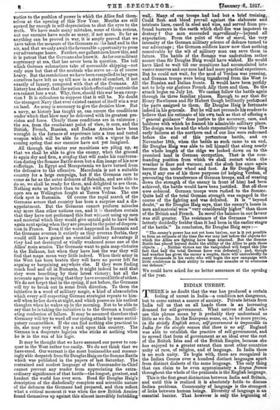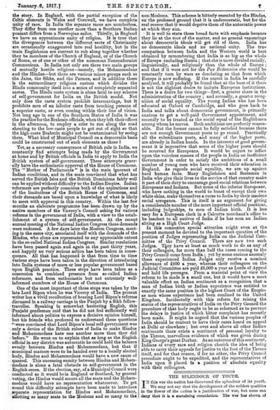INDIAN UNREST. T HERE is no doubt that the war has
produced a certain feeling of unrest in India—a condition not dangerous, but to some extent a source of anxiety. Private letters from India tell us that on all hands there is an increasing demand for self-government. What natives of India who use this phrase mean by it probably they understand as little as we do. In the European sense, or, to be more precise, in the strictly English sense, self-government is impossible in India for the simple reason that there is no se( f. England was able to establish the practice of self-government, and to spread that form of government as an ideal over the rest of the British Isles and of the British Empire, because she has enjoyed to a greater extent than most other countries unity of race, of religion, and of language. In India there is no such unity. To begin with, there are recognized in the Indian Census over a hundred distinct languages apart from distinct dialects of the same language. The only thing that can claim to be even approximately a lingua franca throughout the whole of the peninsula is the English language.
This is the first great distinction between India and Britain, and until this is realized it is absolutely futile to discuss Indian problems. Community of language is the strongest of links between human beings. Diversity of language is an essential barrier, That however is only the beginning of the story. In England, with the partial exception of the Celtic elements in Wales and Cornwall, we have complete unity of race. In India the separate races are numberless. They differ from one another more than a Southern Italian. peasant differs from a Norwegian sailor. Thirdly, in England we have an approximate unity of religion. It is true that the divergences between the different sects of Christianity are occasionally exaggerated into real hostility, but in the main Englishmen are content to rub along together whether they be members of the Church of England, or of the Church of Rome, or of one or other of the numerous Nonconformist Communions. In -India not only are there two main groups of mutually hostile religions—namely, the Mohammedans and the- Hindus—but there are various minor groups such as the Jains, the Sikhs, and the Parsees, and in addition there is the extraordinary religious custom which divides the Hindu community itself into a series of completely separated castes. The Hindu caste system is alone fatal to any scheme of self-government for India on the British model. Not only does the caste system prohibit intermarriage, but it prohibits men of an inferior caste from touching persons of a superior caste, or even coming within their line of vision. Not long ago in one of the Southern States of India it was the practice for the Brahmin officials, when they left their offices in the afternoon, to employ a crier to run along the road shouting to the low-caste people to get out of sight so that the high-caste Brahmin might not be contaminated by seeing them. What kind of Municipal Council on a democratic basis could be constructed out of such elements as these Yet, as a necessary consequence of British rule in India, we constantly find attempts being made by the Government at home and by British officials in India to apply to India the British system of self-government. These attempts gener- ally have the enthusiastic approval of the House of Commons. The " Mother of Parliaments " is in the main ignorant of Indian conditions, and in the main convinced that what has served the British Isles and the British Dominions fairly well can be applied without difficulty to the Indian Empire. Indian reformers are perfectly conscious both of the aspirations and of the limitations of the British House of Commons, and their demands- are based upon a knowledge of what is likely to meet with approval in this country. Within the last few months an elaborate programme. has been drawn up by the native members of the Viceroy's Council asking for various reforms in the government of India, with a view to the estab- lishment of a system of- self-government. At the recent annual meeting of the National Indian Congress these demands were endorsed. A few days later the. Moslem Congress, meet- ing in the same city, associated itself with the demands of the Hindus, who alone are represented to any appreciable extent in the so-called National Indian Congress. Similar resolutions have been passed again and again in the past thirty years, and happily no very serious action has been taken in conse- quence. All that has happened is that from time to time various steps have been taken in the direction of introducing into India systems of more or less popular government based upon English practice. These steps have been taken as a concession to combined pressure from so-called Indian reformers, and from enthusiastio but not extremely well- informed members of the House of Commons.
One of the most important of these steps was taken by the late Lord Ripon when he was Viceroy of India. The present writer has a vivid recollection of hearing Lord Ripon's reforms discussed in a railway carriage in the Punjab by a Sikh fellow- traveller. Speaking in somewhat hesitating English, this Punjabi gentleman said that he did not feel sufficiently well informed about politics to express a decisive opinion himself, but his friends who professed to understand these questions "were convinced that Lord Ripon's local self-government was only a device of the British rulers of India to make Hindus and Mohammedans hate one another more than they did before." He went on to explain that as long as the English official in any district was autocratic he could hold the balance evenly between Hindus and Mohammedans, but that if municipal matters were to be handed over to a locally elected body, Hindus and Mohammedans would have a new cause of quarrel. This unceasing enmity between Hindus and Moham- medans is alone a fatal obstacle to self-government in the English sense. If the election, say, of a Municipal Council were conducted as it would be in England or Scotland, by general voting, the Hindus would secure all the seats and the Moham- medans would have no representation whatsoever. To get round this difficulty attempts have been made to introduce separate representation for Hindus and Mohammedans, -allotting so many seats to the Moslems and so many to the non-Moslems. This scheme is bitterly resented by the Hindus, on the professed ground that it is undemocratic, but for the real reason that it would deprive them of the autocratic power at which they aim. It is well to state these broad facts with emphasis because they lie at the root of the matter, and no general vapourings about democratic ideals will get rid of them. India has no democratic ideals and no national unity. The true comparison between India and the Western world is best obtained by remembering that India is as big as the whole of Europe excluding Russia ; that she is more divided racially, linguistically, and religiously than the whole of Europe ; and that if it were not for the Pax Britannica she would bo constantly torn by wars as desolating as that from which Europe is now suffering. If the unrest in India be carefully analysed, it will probably be found that at the base of it there is not the slightest desire to imitate European institutions. There is a desire for two things—first, a greater share in the administration of the country • and secondly, a greater recog- nition of social equality. The young Indian who has been educated at Oxford or Cambridge, and who goes back to India and talks about democratic government, is primarily anxious to get a well-paid Government appointment, and secondly to be treated as the social equal of the Englishmen among whom he moves. Both ambitions are perfectly reason- able. But the former cannot bo fully satisfied because there are not enough Government posts to go round. Practically all the subordinate posts, and many of the higher posts, are already in Indian hands. In the interests of good govern- ment it is imperative that some of the higher posts should be reserved for Europeans. It would be unjust to inflict upon the voiceless masses of the people in India an inefficient Government in order to satisfy the ambitions of a small number of young men who have received their education in England. As regards social equality, we are up against hard human facts. Many Englishmen and Scotsmen in India who give their lives to the service of that country make it part of their duty to encourage good social relations between Europeans and Incians. But some of the inferior Europeans, -who have nothing in the world to boast of except their own white skins, make themselves a curse to India by. their insolent racial arrogance. This in itself is an argument for giving a considerable number of the more important official positions, including judgeships, to men of Indian birth. It is less easy for a European clerk in a Calcutta merchant's office to be insolent to all natives of India if he has seen an Indian. sitting as a High Court Judge. In this connexion special attention might even at the present moment be devoted to the important question of the position of Judges representing India on the Judicial Com- mittee of the Privy Council. There are now two such Judges. They have at least as much work to do as any of their colleagues, for more than half the cases coming to the Privy Council come from India ; yet by some curious anomaly these experienced Indian Judges only receive a nominal allowance of £400 a year, whereas their colleagues on the Judicial Committee are paid £6,000 a year as Lords of Appeal and hold life peerages. From a material point of view the reform to be made is a small one, but it would have a most valuable effect on Indian sentiment as a recognition that a man of Indian birth or Indian experience was entitled to exactly the same position in the highest Court of the Empire as men whose experience had been confined to the Muted. Kingdom. Incidentally with this reform for raising the status of the representatives of India on the Privy Council the procedure of that body ought to be so reformed as to prevent the delays in justice of which bitter complaint has recently been made. It might be argued that the various peoples of India should be content to have their cases heard on appeal at Delhi or elsewhere ; but over and above all other Indian sentiments there exists a sentiment of personal loyalty to the Throne, marvellous evidence of which was given during King George's great Durbar. As an outcome of this sentiment, Indiana of every race and religion cherish the idea of being able to carry their appeals for justice to the foot of the Throne itself, and for that reason, if for no other, the Privy Council procedure ought to be expedited, and the representatives of India upon it placed in a position of absolute equality with their colleagues.











































 Previous page
Previous page